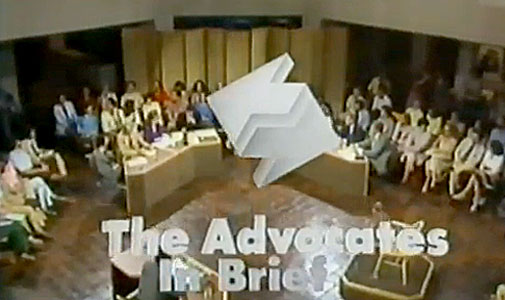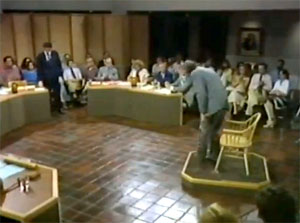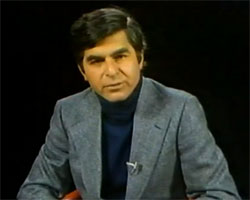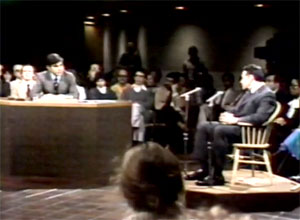
If it please the court, I'd like to advocate on behalf of The Advocates.
It's a series whose time has come. Again.
For those too young to remember, or for those who never caught an installment, The Advocates was a weekly public-TV presentation from 1969 through 1974, revived as a bi-weekly program for most of 1978-79. Co-produced by Boston's WGBH and Los Angeles' KCET, it was promoted as the "PBS Fight of the Week," and while the fisticuffs were all verbal, it could pack a wallop. Many an intellectual hotshot left the arena with his or her ego bruised...
The Advocates was vastly more entertaining and enlightening than the so-called "debates" among Presidential contenders we see on television every four years. As the several recent telecasts involving Republican hopefuls underscore, these events are little more than opportunities for candidates to recite their respective talking points and slogans. In addition, the journalists whose questions they try to evade rarely call their bluffs or press hard for detailed elaboration, lest they look too partisan or pushy to a media-wary public.

The Advocates' format eliminates the interlocutors and leaves the debaters nowhere to run. It essentially recasts debate as a mock trial, with an "attorney" for the opposing sides of a question presenting expert witnesses to help make his or her case. At its best, it was as much fun to watch as a courtroom sequence on Boston Legal.
The series attracted top-tier participants. For instance, when The Advocates put the Equal Rights Amendment on its docket, the lead counsel in favor of passage was Eleanor Smeal, then president of the National Organization of Women, while the opposition arguments were framed by Phyllis Schlafly, the formidable head of Stop ERA.
The Advocates never won an Emmy, perhaps because there was no category for it. It did win a George Foster Peabody Award after its first season, on what was then still the National Educational Television Network, forerunner of PBS.

The Peabody board's citation called it a "series of bold, invigorating debates of crucial issues," grounded in the producers' belief "that in a courtroom atmosphere such controversial problems as abortion, smog versus the auto, the use of marijuana, or the danger of offshore drilling could be dramatized and reasonably, if hotly, discussed."
(Courtesy of YouTube, here's a sampling from a 1979 installment arguing for, and against, the legalization of marijuana, with Michael Dukakis as moderator:)
Note that most of the hot-button issues the board mentioned have, if anything, gained a few degrees Fahrenheit with the passing years. The format would work just as well today, on issues ranging from the credibility of global-warming science to the smartest way to deal with Iran's nuclear pursuits. The Advocates could "try" the realities and misconceptions of "Obamacare," or even the overall success or failure of the current President's administration.

What's more, the potential for public participation in The Advocates is much greater now than it was when it last aired, more than 30 years ago. We're well into the age of instant communication, live coverage of high-profile trials and non-stop punditry.
If the American public can cast votes by phone for their favorite performers on American Idol and Dancing with the Stars, why not use the same phone-vote system to get an indication of how citizens views various issues and controversies before and after they've watched courtroom-style testimony and cross-examination?
Who knows? Maybe the revenues from the phone calls could be applied to election costs or federal deficit reduction...
So, in summation (to adopt the courtroom tradition of closing arguments), somebody in the public television system -- or, if PBS is too strapped for funds, somebody at TruTV or some cable news network -- should consider reviving The Advocates. It was born in the late 1960s, a time of division and upheaval in America.
Watch video of New York police clearing Zuccotti Park and tell me a revival is not overdue.